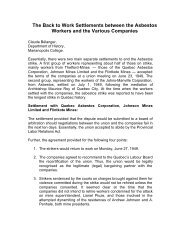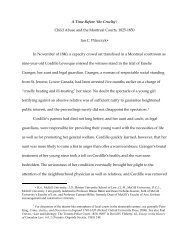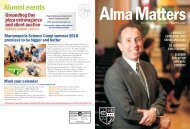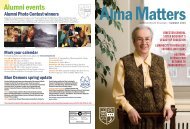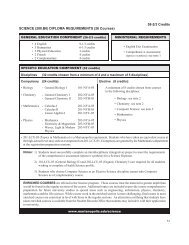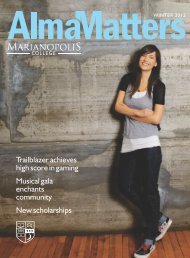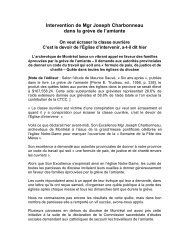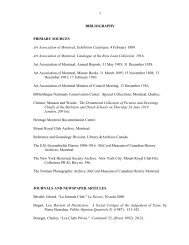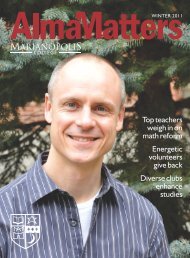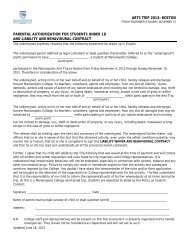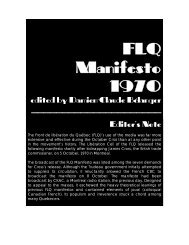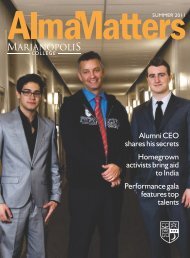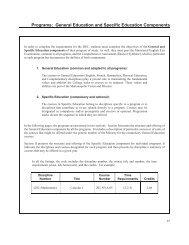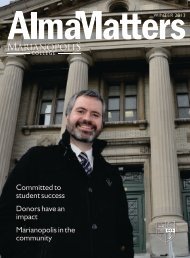General Education: Englishidentifying the characteristics of theparticular genre studied, and therelationship of the texts to theirhistorical and literary period.These courses also continue thedevelopment of students’ readingand writing skills with an emphasison providing guidance and practicein writing a well-crafted essay(1000 words).Comics as LiteratureThis course introduces students to thegraphic novel and the academic studyof comics as literature. It provides avocabulary with which to analyzeboth the visual and textual aspectsof comics, as well as information onthis relatively new medium’s history,developments and conventions.Through in-class work and writtenassignments, students in this courselearn to perform effectiveliterary/visual analysis, explorecomics as a diverse and evolvingmedium, and better understand theimportance of genre in studying anyform of narrative.Detective FictionThis course explores the development,conventions and features of the formaldetective story. Through the examinationof works representative of keyperiods in the history of the genre,students explore the relationshipbetween a story’s particular use of theformal characteristics and the beliefsand anxieties of the historical periodin which it was written.Short FictionStudents learn to recognize the formalcharacteristics of the short story andthe use of literary conventions withinthe short story, and to produce literaryanalysis and oral presentationsdemonstrating their understanding.28The WesternThe Western remains a popular andinfluential genre constituted by avariety of motifs (e.g. cowboys,Native Americans, saloons, six gunsand sheriffs), settings (e.g. wild openspaces and the American West circa1870), plots (e.g. a train/stagecoachversus thieves and a man seekingrevenge) and subjects (e.g. freedom,violence, otherness andpersonal/national regeneration).Through short stories, novels andfilm, this course will explore how theformulas of the early Western haveparadoxically enabled the genre’smore recent engagement withrevisionist historicism and postmodernism.Folk and Fairy TalesThis course explores the conventionsand characteristics of folk and fairytales. Students employ a variety ofcritical approaches (e.g. Freudian,Jungian, Feminist, Marxist) toanalyze tales. The course focusesfirst on fairy tales in early writtenforms, then on versions of these talesby authors such as Charles Perrault,Jacob and Wilhelm Grimm, andJoseph Jacobs, and finally onreinterpretations by 20th and 21stcentury authors and filmmakers. Thecourse also includes study of originalliterary tales by authors such as HansChristian Andersen and Oscar Wilde.Tragedy‘Tragedy’, as used in the media,describes an event that is emotionallydevastating. This course explores thedistinction between that common useand its roots in ancient Greek drama.Tragedy will gain perspective fromcritical theories (existentialistphilosophy, evolutionary psychology,Adlerian psychoanalysis and gendertheory). Film screenings willsupplement readings for discussionof performance and filmic productionaspects. In addition to submittingconventional essays, you will also beasked (in groups) to write, film andultimately screen your own shorttragic film.PoetryIn this course, students will examinea variety of poetic forms and styles,covering a broad historical range,with emphasis on more recentsamples from the 20th and 21stcenturies. Topics to be coveredinclude: an overview of poeticperformance (from bardic recitationto the contemporary poetry slam);analyses of sound, rhythm and meter;a brief review of popular poetic forms(including ballads, sonnets, epigrams,and haikus); an exploration of controversiesregarding the interpretation ofpoetry; and, examinations of poets’prose commentaries on theirinfluences, practices, andphilosophies.Twentieth-Century PoetryThis course examines the American,British and Canadian poetry of thetwentieth century in relation to ahistorical period. Students are taughtto apply a critical approach to thedifferent forms of poetic discourserepresentative of this period throughthe study of specific literary movementslike imagism, formalism, Beat,confessional, projective and feministverse.Cinema and the NovelThis course explores the challengesinherent in adapting novels in general,and the novels considered in class, inparticular, for the feature film. Thehistory of the relationship between
the novel and the feature film isconsidered, as are the similaritiesand differences of these two media.19th-Century Gothic NovelStudents study the formal characteristicsof Gothic literature, a genre thatmanipulates fear and mystery in orderto probe spiritual, psychological, andsocial concerns that may be toodisturbing to be openly examined.The course also makes generic andcultural comparisons of this Victoriangenre with a twentieth-century filmversion of one of the texts.Novel History: Historical FictionAfter World War IIIn the historical novel, documentedversions of the past serve as the seedsof fictional narrative. In the last fiftyyears, this novel form explores, inthree post-war novels, the relationshipbetween fact and fiction; the politicalimplications of representing the pastin works of art; and the gatheringskepticism toward stories that claimto establish definitive, universaltruths.The Social NovelThe social novel emphasizes theinfluence of the social and economicconditions of an era on characters andevents. The objective of this course isto enable students to understand theformal features of the social novel.Students should understand eachwork’s relationship to literary andhistorical contexts and should learn toexplicate representative works. Thisanalysis will reflect a knowledge offormal characteristics and relation toperiod (social, cultural, and literary).We will pay particular attention tonovel structure and narrative voice aswell as character, symbolism, andwriting style.Contemporary Canadian NovelThis course introduces students totwo contemporary Canadian novels:George Bowering’s Caprice andHiromi Goto’s Chorus ofMushrooms. Through our analysisof these novels, we explore twocontrasting visions of Canada andCanadian identity: Bowering’sdepiction of Canada as a modelto which to aspire, and Goto’srepresentation of Canadian identity asoppressive and in need of redefinition.Throughout the course, we explorenot only the primary pre-occupationsthat underlie Canadian novels of thisperiod but also the particular narrativechoices that these authors have made.Contemporary American DramaThe tragicomedy of contemporaryAmerican life is thematically exploredthrough Contemporary Drama’s earlyroots in the traditions of the Theatreof the Absurd, postmodernism, andexistentialism, to its more political,social, and experimental aspirationsin the Off-Off Broadway and performanceart movements. Students alsoexplore the implications of race, class,identity, gender, and AIDS in thevarious plays from this period.The Contemporary Novel of IdentityThis course explores one of theconventions of the novel: theme asrelated to the concept of identity. Inall three novels, the question ariseshow individuals create their identities– parents being a major influence; thiscourse, then, explores the parent-childrelationship and the process by whichthe protagonists aim to construct theirown identity.General Education: EnglishLiterary Themes603-103-MQ (2-2-3) 2.33 credits- 4 hours of class- 3 hours of homeworkCourses in this category offer theopportunity to study examples ofliterature which illustrate a particulartheme or idea. Students are asked totrace the selected theme through avariety of literary texts, all the whilebeing encouraged to develop theiranalytical skills as well as theirreading and writing skills.One of the practical objectives ofthese courses is to enable the studentto produce a coherently-argued andwell-crafted essay (1000 words inlength).Civilization in CrisisThis course focuses on the theme ofcivilization in crisis. We begin byexamining Margaret Atwood’s TheHandmaid’s Tale, focussing on theways in which her representation of afuturistic civilization in crisis reflectssocial anxieties particular to theperiod in which her novel waswritten. Then, through our analysis ofChinua Achebe’s Things Fall Apart,we re-examine our assumptions aboutcivilization and the often ironiccauses of its decline.Liars and ThievesIn this course we will explore thefigure of the liar and thief in literaryworks and the value systems theyexpress. Beginning with myths andfolktales, we will look at the figure’sappearance as the Trickster archetype,a figure of deviousness and changewho manipulates with words andtrickery. In subsequent texts, we willexplore the ways the depiction of theliar and thief as hero or villain serves29
- Page 2 and 3: VISIONMarianopolis College, drawing
- Page 4 and 5: GENERAL INFORMATION: Introduction t
- Page 6 and 7: AdmissionsOUT-OF-PROVINCEAPPLICANTS
- Page 8 and 9: Financial Information• Birks Fami
- Page 10 and 11: Financial InformationConfirmation F
- Page 12 and 13: Academic Information• Failure (EC
- Page 14 and 15: Academic InformationThose who are a
- Page 16 and 17: Rules and Regulationsand whether su
- Page 18 and 19: EDUCATIONAL RESOURCES & SERVICESAss
- Page 20 and 21: Educational Resources and ServicesS
- Page 22 and 23: CHOOSING A PROGRAMDiploma Programs
- Page 24 and 25: CertificatesSpecial InterestCertifi
- Page 26 and 27: Programs: General Education and Spe
- Page 28 and 29: General EducationGENERAL EDUCATION
- Page 32 and 33: General Education: Englishas the fi
- Page 34 and 35: General Education: Englishintended
- Page 36 and 37: General Education: Frenchand curren
- Page 38 and 39: General Education: Frenchce cours t
- Page 40 and 41: General Education: HumanitiesHumani
- Page 42 and 43: General Education: Humanitiesunders
- Page 44 and 45: General Education: Humanitiespracti
- Page 46 and 47: General Education: Humanitiespracti
- Page 48 and 49: General Education: Physical Educati
- Page 50 and 51: General Education: ComplementaryCom
- Page 52 and 53: General Education: ComplementaryMod
- Page 54 and 55: SECTSpecificEducation Component- Sc
- Page 56 and 57: Science: Biology - ChemistryBiology
- Page 58 and 59: Science: Mathematics - PhysicsR and
- Page 60 and 61: 56-2/3 to 58 CreditsSOCIAL SCIENCE
- Page 62 and 63: Social Science: Profiles - General
- Page 64 and 65: Social Science: Psychology ProfileE
- Page 66 and 67: Social Science: Law, Society and Ju
- Page 68 and 69: Social Science: Honours CommerceHon
- Page 70 and 71: Social Science: Anthropology - Biol
- Page 72 and 73: Social Science: History - Mathemati
- Page 74 and 75: Social Science: Political Sciencedi
- Page 76 and 77: Social Science: Religion - Sociolog
- Page 78 and 79: 54-2/3 CreditsCREATIVE ARTS, LITERA
- Page 80 and 81:
Creative Arts, Literature and Langu
- Page 82 and 83:
Creative Arts, Literature and Langu
- Page 84 and 85:
Creative Arts, Literature and Langu
- Page 86 and 87:
Creative Arts, Literature and Langu
- Page 88 and 89:
Creative Arts, Literature and Langu
- Page 90 and 91:
Creative Arts, Literature and Langu
- Page 92 and 93:
58-2/3 CreditsMUSIC (501.A0) DIPLOM
- Page 94 and 95:
MusicEar Training and Theory IV551-
- Page 96 and 97:
59-1/3 CreditsARTS AND SCIENCES (70
- Page 98 and 99:
Arts and Sciences: English - Humani
- Page 100 and 101:
Arts and Sciences: Art History - Ar
- Page 102 and 103:
Arts and Sciences: Mathematics - Mu
- Page 104 and 105:
Arts and Sciences: Multidisciplinar
- Page 106 and 107:
56-2/3 to 58 CreditsLIBERAL ARTS (7
- Page 108 and 109:
Liberal Artsof evolution; the first
- Page 110 and 111:
Liberal ArtsOptionalIn addition to
- Page 112 and 113:
Teaching FacultyFLEISCHER, George T
- Page 114 and 115:
Teaching FacultyTRILLER, Bernice Sh
- Page 116:
INDEX II: Programs and CoursesGener



